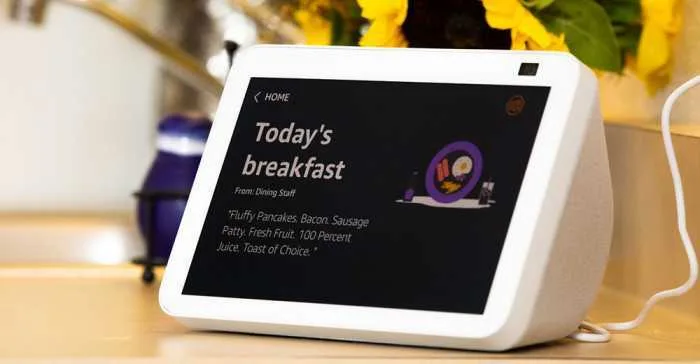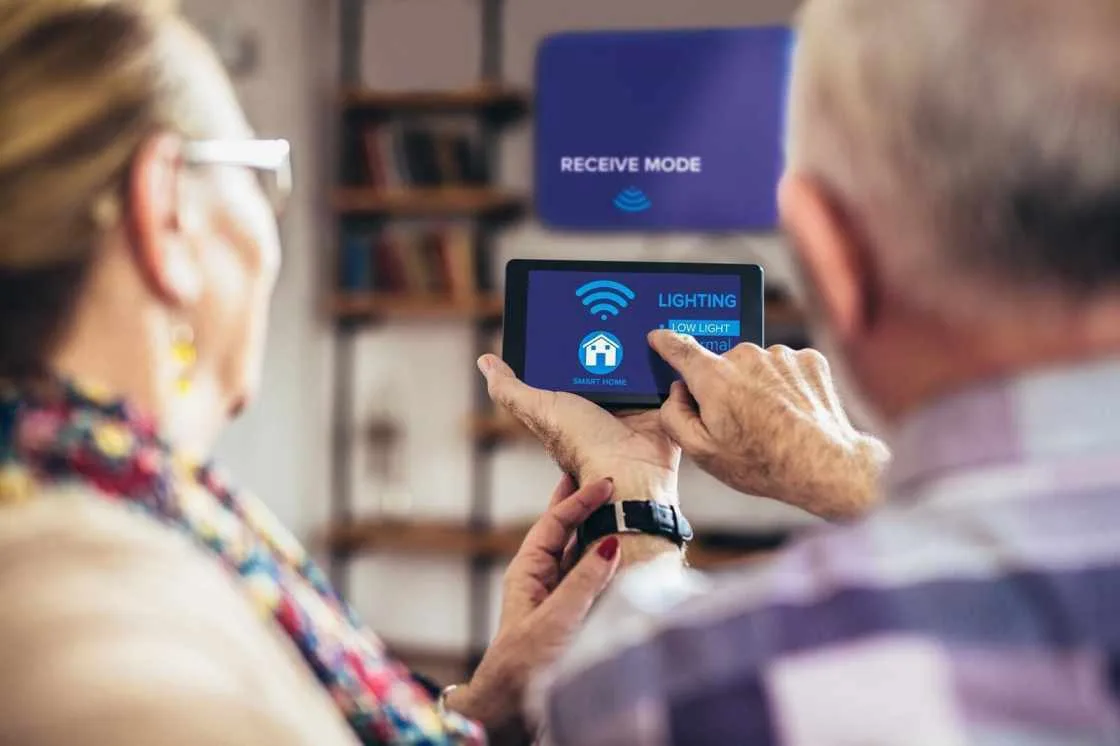Amazon added two new solutions to its Alexa Smart Properties line on that will allow seniors and healthcare providers to integrate the company’s Alexa voice agent into their properties and allow residents and patients to stay connected, informed and entertained.
Designed specifically for the needs of senior residences and healthcare facilities, Amazon explained that Alexa Smart Properties simplifies the deployment and management of Alexa-enabled devices at scale, helping properties deliver personalised experiences to residents and clients. patients, and increase the productivity and operational efficiency of the healthcare team.
Alexa Smart Properties allows senior residents to keep in touch with loved ones, connect with their community, access community news, and more, using the Amazon Echo device in their room.
Residents will be able to use Alexa devices at nursing home centers to call their family members and others close to them, as well as keep up to date with their community and other community news.
The devices can also be used for announcements, allowing residents to communicate with each other using direct audio messages and make voice and video calls, and they can simplify other center activities such as registration, maintenance requests and various administrative tasks. Amazon believes this will help make facilities more efficient and productive.
Amazon explained that the new Alexa solution will allow senior residents to stay in touch with loved ones, connect with their community, access community news and more using an Amazon Echo device in their bedroom.
Family members and friends outside the property can easily connect with residents via Alexa calls, he added.
Amazon added that senior housing administrators are able to tailor their residents’ experiences by personalizing community information such as activity schedules and meal menus.
Meanwhile, healthcare team members can communicate more effectively with residents using Alexa communication features, which allow them to make announcements, voice and video calls, or send direct audio messages. to other Alexa-enabled devices throughout the property.
Alexa can also enable service personnel to save time and improve productivity by streamlining activities such as check-in, service requests, and administrative tasks.
With Amazon’s new solution for hospitals, patients will be able to use Alexa to communicate with care staff, control the devices in their room, and stay entertained with news and music. Healthcare providers can also communicate with their patients using Alexa features like calling and Drop-In, without having to enter the patient rooms.
This could also help hospitals be more productive and conserve their medical supplies and protective equipment like gloves, masks and gowns, notes Amazon. (PPE shortages had been an ongoing issue in some locations as COVID spiked during the pandemic.)
“Most nursing care facilities have ways to connect to wards, but Amazon’s offering will provide much more functionality,” said Jonathan Collins, director of research at ABI Research.
“By leveraging the scale of its Alexa device business, Amazon clearly has the ability to drive competitive pricing as well as offer more functionality in this market,” he said.
He added that Alexa could affect staffing in nursing facilities.
“By supporting all the features offered by Alexa devices and centralised management of the system, an enterprise can significantly improve efficiency,” he said.
Additionally, Collins noted that the system would likely free staff to meet the most urgent customer support needs.
“Using voice-activated technology to replace human labor could deliver real efficiencies,” added Michael Cannon, director of health studies at the Cato Institute, a libertarian think tank in Washington, D.C..
“It could lower the cost of senior and hospital care or it could increase it if seniors and patients decide they like independence so much, that facilities invest so heavily in Amazon technology that they end up spending more on it than on the human labor that the devices replace.” he said.
Patient Game Changer
In hospitals, the new Alexa solution can be used by patients to communicate with their caregivers, control devices in their room or get informed and entertained with news and music, according to Amazon.
It added that with features like calling and drop-in, healthcare providers can communicate with patients quickly and easily – without having to enter patient rooms. In this way, hospitals can increase productivity, save on medical supplies and protective equipment such as masks, gloves and gowns, and free up time for staff to provide more personalised care.

In addition, hospitals can provide information tailored to their institution, such as notifications of schedule changes or cafeteria menus, as well as skills such as games, podcasts, and more.
“The voice is intuitive for patients, regardless of age or tech savvy,” Peachy Hein, executive director of medical and surgical services at Cedars-Sinai in Los Angeles, said in a press release.
“Because it’s so easy to work with,” she continued, “patients can use Alexa to connect with their care team and be entertained as soon as they move in, while healthcare providers can simplify tasks to spend more time caring for them. patients “.
“This will completely change the rules of the game for improving the operation of our hospital,” she added.
Patient Centric Approach
At the Houston Methodist, Alexa fits perfectly into the hospital’s patient-centered approach, ”said Ambulatory Clinical Systems Administrative Director Josh Saul.
“We try to put patients at the center of what we do, and Alexa allows us to do that,” he told TechNewsWorld.
He added that Alexa Smart Properties tools are also being used in the hospital’s outpatient office in the Ambient Listening program.
“It uses Amazon tools to help our doctors reduce burnout,” he said. “This allows the doctor to interact more solidly with the patient without typing or clicking on everything that was said.”
“Visits aren’t voice recorded with the technology,” he explained. “It automatically transcribes the session, and the transcription is stored in a secure HIPPA-compliant application that ties into our electronic medical record system.”
“The sky’s the limit for voice technology,” he added. “Our grand idea is that we can capture all the appropriate documentation we need by leveraging voice technology, versus going behind a computer and typing it out.”
Concerns For Privacy
As healthcare providers handle very sensitive personal information, privacy is always a concern with whatever technology they use.
According to Amazon, its new Alexa solutions are designed with privacy in mind.
No personal information is shared with Alexa to use the device, and voice recordings are not saved, he noted.
Additionally, each Amazon Echo device offers multiple layers of privacy protection, and residents and patients can disable Alexa’s ability to respond to the wake-up call at any time by simply pressing the mute button on the top of their Echo device.
Additionally, Amazon implements administrative, technical, and physical safeguards for protected health information received as part of HIPAA-eligible skill interactions.
The solutions can pose privacy concerns, but no more than in any other environment using devices connected to the Internet, a smartphone or a smart speaker, argued Wright.
“Amazon has enough privacy protections built into solutions, and it is in their economic interest to ensure that the privacy of the patient and healthcare workers is protected,” he said.
“Failure for Amazon to protect the privacy of patients and workers would be a public relations nightmare and could also result in legal sanctions,” he added.
Beyond the Smart Speaker
With the introduction of these new Alexa solutions, Amazon is delivering on its promise to developers made earlier this year.
“One of the things that came out of the last Amazon developer event was that we should expect Alexa to be in a lot more contexts than we’re used to,” said Ross Rubin, principal analyst at Reticle Research, a consumer technology consulting firm in New York City.
“We tend to think of Alexa living in a smart speaker most of the time and being a voice control agent, but Amazon has been working to make this a multimodal experience with a visual display and built-in gestures,” he said.
“It’s selling it as a technology for businesses and companies,” he continued. “This includes white label opportunities, like allowing Disney to use its own wake-up call‘ Hey, Disney ’or Verizon to use‘ Hey, Verizon ’.”
Wright added that the new solutions will help Alexa gain momentum in the business and commercial space.
“It has been present for some time in the workplace through Alexa for Business and in hospitality environments such as hotels,” he said.
“The new Alexa solutions for hospitals and seniors’ homes will help expand Alexa’s footprint, potentially introducing new customers into its ecosystem,” he continued.
“More importantly,” he added, “it will significantly demonstrate how smart assistants like Alexa can be used to make people’s lives more convenient and – in the case of healthcare environments and during a pandemic – safer, as well as promoting better health outcomes for both patients and healthcare professionals. ”
WHAT’S THE IMPACT?
As digital monitoring tools increase seniors’ ability to live independently in their own homes, technologies such as Amazon Alexa have been highlighted by experts as an important resource due to its intuitive voice-based interface. Amazon’s move to build its own dedicated support for monitoring and emergency alerts could increase adoption among families and further consolidate the AI assistant’s place in the homes of the elderly.
THE LARGER TREND
From robotic pets to innovative fall detection and emergency communication tools, a wide range of new technologies are trying to help seniors living alone stay safe and healthy. But even just within the AI personal assistant space, new products are being developed with the elderly in mind.
As far as Amazon is concerned, it was rumored as early as the spring of 2018 that the company was building a “Health & Wellness” team within its Alexa division. At that time, the potential focus areas included retirement provision, diabetes management and maternal health.
13 Different Ways Alexa Can Help Seniors Living Alone
1. Set Up Reminders
2. Date And Time
3. Jokes And Riddles
4. Entertainment
5. General Information
6. Make Lists
7. Up-To-Date Reports
8. Control Smart Home Devices
9. Calls And Messaging
10. Create An Intercom Network For Your Home
11. Customisable
12 Shopping
13. Medical Alert
Alexa’s Drop In Feature
In hospitals, healthcare providers can communicate with patients using the Drop In feature, which allows you to start a conversation between devices or with your Alexa contacts. This will reduce the need to enter the patient’s room and save on medical supplies and protective gear, according to Amazon. Hospitals can also provide patients with information about their institution through their Alexa devices, such as cafeteria menus, schedule changes, and more.
“The voice is intuitive for patients, regardless of age or technical understanding,” said Peachy Hain, Cedars-Sinai’s executive director of Medical and Surgical Services, in a press release.







